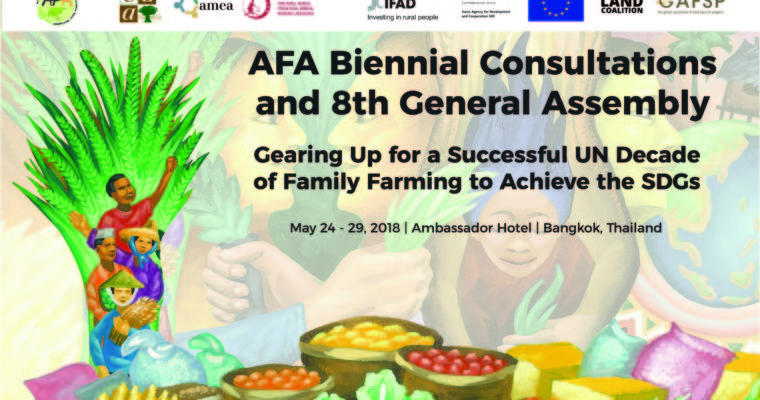On 24 May, a one day workshop on production of relevant data and knowledge on family farms was held in Bangkok Thailand, bringing together farmers’ leaders from 17 national platforms in Asia. The workshop was jointly organized by the Asian Farmers Association (AFA), the World Agriculture Watch Initiative (WAW), Collectif Strategies Alimentairies (CSA) and AgriCord, back to back with the AFA General Assembly.
During the event different aspects on data, information and monitoring systems were presented by the countries depending on the priorities set: (i) Pakisama from the Philippines presented the need to define and harmonize indicators to monitor the transition to organic and agro-ecology type of farming; (ii) the LAO Farmers Network presented the use of Facebook, as a tool to enhance the communication among its members and promote a renewed image of the family farmers to the rest of the society in Laos (iii) SEWA (India) shared its experience in digital banking to support Women’s initiatives (iv) the Central Tea Cooperative Federation of Nepal shared information on the monitoring system of their members’ affiliate cooperatives and (v) the Vietnam National Farmers Union presented their current information system project with the aim to document the profiles of 10 million members of Family Farmers. Other initiatives focusing on data issues to inform policy making were also presented with specific interest and possible common developments with ILC on Land Matrix and Land Observatories as well as with Burundi experience of CAPAD supported by CSA. The presentation of WAW framework to characterize the farm types ranging from family farms to family business farms up to corporates was illustrated by the case of Thailand rubber farms.
The discussions were very rich and several questions regarding information systems for holding typeswere raised by the participants on: (i) how to mobilize information systems to support family farmers; how to prioritize the information to be gathered; what could be the cost benefit analysis of such systems; what is the point to differentiate family farms and family business farms; the need to harmonize without standardizing and the linkages between local and more global databases on Family farming; how could the information systems be mobilized to help marketing; how to deal with commercial and food crops; what criteria to use for classification of farms; can WAW framework be used to monitor the effect of SEWA support.
Among the proposed actions for the way forward is the establishment of partnerships for common projects that respond to the farmers needs and provide relevant information to make family farms more visible at global level. Projects with a regional perspective on climate change are under elaboration with different partners, using opportunities offered by the Green Climate Fund. (FAO)




Comments are closed